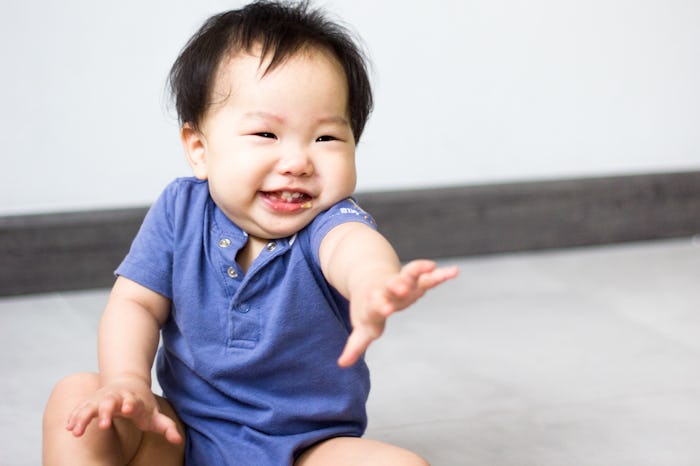Life

For Your Own Peace Of Mind, Here's Why Your Baby Just Randomly Waves To Empty Corners
Your baby hitting a milestone, like waving goodbye to grandma for the first time, is usually met with lots of cheering and enthusiasm. Less exhilarating and way more creepy is the first time you catch your baby waving at nothing. Why do babies wave at nothing? Are they purposefully trying to be spooky? Is your baby seeing a ghost? What the actual heck is going on?
"Most babies start waving around 9 months, but there is some variation as some kids will start earlier, and some later," Dr. Scott Krugman, vice chair of the Department of Pediatrics at the Herman & Walter Samuelson Children’s Hospital at Sinai Hospital of Baltimore tells Romper. "The key brain development milestones include vision and motor skills along with the understanding of what an adult is doing (imitation)."
When babies who seemingly have the wave down pat start waving at what appears to be nothing, they may actually think they're waving at something when they're really not.
"Although babies learn to identify the human face early in life — around 1 month [of age] — they may wave at things that aren't human," pediatrician and healthcare educator Dr. Jarret Patton tells Romper. "The person that waves back and speaks to the baby gives the baby a positive incentive to wave at more people. However, they may wave at many things initially to determine if they get a wave or a positive response in return."
I guess that's what us moms get for frantically trying for months and months to get our babies to wave back to us when we wave at them — confusion about who and what will wave to them. I remember waving my hands in my son's face and picking up his tiny little fists to wave them around in response to try to "teach" him how to wave. I was incredibly thrilled when he started to wave back, but when he started waving to the corner of the room where absolutely nobody was, I was more than a bit creeped out.
"If children developmentally have the ability to wave, it is possible that they could mistake a picture or other object for a human and wave," Dr. Krugman says. "Most likely this could occur if children think the object looks like a familiar face or someone has been waving and/or encouraging them to wave… so they just keep on going."
By the age of about 9 months, your baby will likely have the coordination to move their arms and hands in such a way that they'll form an adorable little wave. They'll probably even utilize the gesture correctly around this time, but there will also be times when they'll seemingly be waving at absolutely nothing at all that could occur even sooner than this. Seeing your baby stare off into space and wave at the wall or the ceiling can look downright haunting, but pediatricians say there is a simple explanation to this phenomenon.
"As development progresses from head to toe, babies progressively try to use their hands more and more," Dr. Krugman explains. "Before being able to reach out and grab something, the baby needs to gain control of the muscles and actions of the arm and hand. At times, this might look like waving, but it really isn’t."
So, could your baby be waving ghosts or a spirit that you can't see when they wave at what looks like nothing? Some people would say this is absolutely possible (It's me. I'm some people.) but in reality it's likely just another phase of development that your baby is cruising through, so enjoy the creepiness while it lasts.
Experts:
Dr. Scott Krugman, Vice Chair, Department of Pediatrics, Herman & Walter Samuelson Children’s Hospital, Sinai Hospital of Baltimore
Dr. Jarret Patton, Pediatrician and healthcare educator, author of Licensed to Live
This article was originally published on